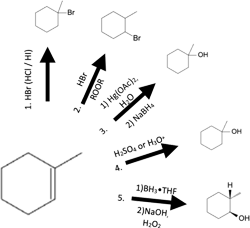How to Actually Survive Organic Chemistry: 5 Habits to Develop Right Away
How to Actually Survive Organic Chemistry: 5 Habits to Develop Right Away
Organic chemistry has a reputation for being the class that derails even disciplined students. The challenge usually isn’t intelligence—it is the strategy you bring into week one. Use the playbook below to stay in control of the pace, build real understanding, and avoid the panic cram.
Quick Guide
- Know Your Syllabus and Calendar
- Practice Actively, Not Passively
- Understand First, Memorize Second
- Organize Notes by Reagent or Reaction Type
- Use People and Office Hours as Force Multipliers
Know Your Syllabus and Calendar
Organic chemistry moves faster than any survey class. Map out quiz and exam dates before the semester starts and block focused study windows—roughly two 4-hour sessions per quiz and three 6-hour sessions per exam. Layer in the reality of weekly lab reports and adjust other courses or work hours around the heavy OChem weeks (the first SN1/SN2 lecture is usually the calm before the storm; HBr/alkene chemistry is when the pace spikes). Planning your load early gives you the slack you’ll need later.
Practice Actively, Not Passively
Reading slides or skimming the textbook will not build reaction recall. Draw molecules, push arrows, name compounds, and work problems daily. Our favorite drill tools:
- Reaction Solver for mechanism and reagent practice
- IUPAC Namer to reinforce nomenclature
- Resonance Solver for charge delocalization reps
- Quizzes to simulate timed checkpoints
Organic chemistry is tactile—hands-on practice cements trends faster than re-reading notes.
Understand First, Memorize Second
Flashcards can get you through a midterm, but they will fail you on synthesis problems and on the MCAT. Ask “why” for every transformation: What makes this nucleophile reactive? Why does SN2 occur in one step? Why do carbocations rearrange? Once the logic is clear, you can memorize representative examples more efficiently and retain them for later exams.
Organize Notes by Reagent or Reaction Type
Arranging reactions by starting functional group (alkene, alkyne, alcohol, etc.) or by mechanism class (SN1/SN2, E1/E2, redox) makes synthesis planning much easier. Build your own reagent maps and annotate them with what your professor emphasizes.

When you can enumerate, say, every transformation of an alkene on demand, multi-step problems stop feeling random. OrgoSolver’s reaction maps can supplement your notebook, but your custom version should reflect exactly what your instructor tests.
Use People and Office Hours as Force Multipliers
Weekly working sessions with one or two reliable classmates keep you accountable and force you to articulate mechanisms out loud—one of the fastest ways to expose gaps. Pair that with consistent office-hour visits; professors and TAs have watched every way a student can struggle with these reactions, and they can usually diagnose your snag in minutes.
Summary
- Schedule backwards from every quiz, exam, and lab report so OChem gets priority time.
- Drill daily with tactile practice (naming, mechanisms, resonance) rather than passive reading.
- Organize reactions by reagent/mechanism and collaborate with peers plus office hours to stress-test your understanding.
Organic chemistry is conquerable when you treat it like a skills course. Start early, stay active, and your future self—whether in the next course or on the MCAT—will thank you.